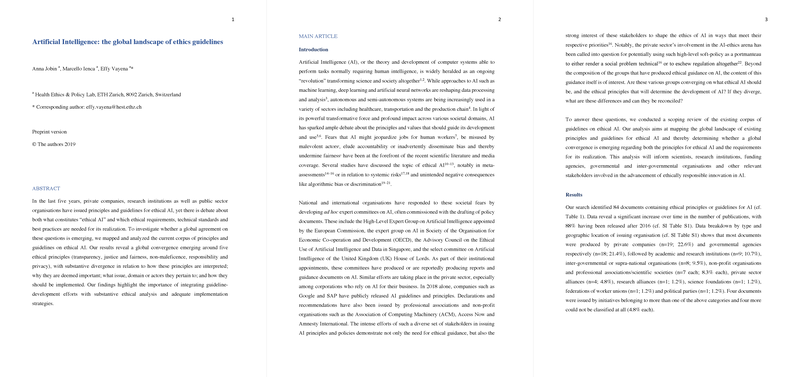Ethical Guidelines for Artificial Intelligence: A Global Perspective
The paper "Artificial Intelligence: the global landscape of ethics guidelines" by Anna Jobin, Marcello Ienca, and Effy Vayena provides a thorough examination of the ethical standards for AI development and implementation proposed by various stakeholders worldwide. The paper aims to identify the convergence and divergence within the global corpus of AI ethics guidelines, mapping out emerging trends and discrepancies. It further discusses the implications of these findings for policy making, technology governance, and research ethics.
Key Findings
The authors conducted a scoping review of 84 documents issued by private companies, governmental organizations, academic and research institutions, professional associations, and non-profits. The examination led to some critical observations:
- Emerging Convergence on Core Ethical Principles:
- Transparency: Included in 73/84 sources, emphasizing explainability and accountability in AI systems.
- Justice and Fairness: Found in 68/84 documents, addressing AI biases and ensuring equitable impacts.
- Non-maleficence: Present in 60/84 guidelines, focusing on preventing harm and security risks.
- Responsibility: Highlighted in 60/84 documents, stressing accountability for AI outcomes.
- Privacy: Emphasized in 47/84 sources, focusing on data protection and personal privacy.
- Significant Divergence in Interpretation and Implementation:
- While there is broad agreement on the importance of these principles, their interpretations and implementations vary significantly. For instance, transparency is associated with multiple facets, from data use to the purpose of AI systems.
- Justice and fairness are variously interpreted across documents, ranging from ensuring diversity and inclusion to addressing biases and discrimination.
- Privacy guidelines also diversified into technical solutions such as differential privacy, governance strategies, and regulatory frameworks.
- Underrepresented Ethical Principles:
- Trust: Cited in only 28/84 guidelines, with contrasting opinions on the desirability of fostering public trust in AI systems.
- Sustainability and Solidarity: These principles appeared less frequently, underscoring a potential gap in addressing AI's ecological and societal impacts.
Implications and Future Directions
Practical Implications:
- Policy Harmonization: The paper suggests an urgent need for cooperative efforts among international governmental organizations to harmonize AI ethics agendas, ensuring coherent and consistent global standards.
- Ethical AI Governance: Emphasizes the importance of including diverse perspectives from underrepresented regions such as Africa, South and Central America, and Central Asia. This will address cultural pluralism and ensure that global guidelines do not disproportionately reflect MEDC priorities.
- Soft Governance Mechanisms: The need for Independent Review Boards (IRBs) in evaluating AI applications across various domains, including in research, governmental, and corporate contexts.
Theoretical Implications:
- Ethical Principle Translation: Future work must focus on translating ethical principles into actionable requirements. The current disparity between guidelines and their practical applications indicates a pressing need for frameworks that bridge this gap.
- Deliberative Mechanisms: Developing mechanisms for resolving conflicts between ethical principles is crucial. Issues such as balancing risks and benefits, ensuring privacy while using extensive datasets, require nuanced, context-specific solutions.
- Expanded Ethical Focus: To better address AI's societal and ecological impacts, ethical AI discourse should expand to include principles such as human dignity, sustainability, and solidarity.
Conclusions
The paper offers an in-depth analysis of the kaleidoscope of ethical guidelines for AI across different sectors and regions. By revealing both convergences on core principles and significant divergences in their application, the paper sets the stage for future efforts to create a more cohesive, inclusive, and practically actionable global agenda for ethical AI. The emphasis on transparency, justice, non-maleficence, responsibility, and privacy marks a step towards ethically responsible AI innovation, but achieving these goals will require concerted global collaboration and a keen sensitivity to regional and cultural variances.
